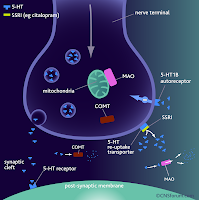Favism. G6PD deficiency. Name derived from the hemolytic anemia a patient with G6PD deficiency will suffer after consuming fava beans. My preceptor at my most recent rotation recently emailed me, asking if I would fill a prescription for the second generation antihistimine, meclizine, for a patient with G6PD deficiency. Before I could answer, I had to take a few steps back and look at what exactly G6PD deficiency is.
G6PD, or glucose-6-phosphate dehydrogenase, is the rate limiting enzyme for a process that produces NADPH as a byproduct. NADPH is a reducing agent used in the synthesis of fatty acids and cholesterol and is also utilized to protect cells from oxidative damage.
NADPH is essential to erythrocytes, which having no nucleus, during their 120 day lifecycle are unable to synthesize new proteins to repair cellular damages. Erythrocytes rely heavily on reducing agents, like NADPH, to protect against oxidative damage.
Patients with G6PD deficiency have genetic mutations in the glucose-6-phosphate dehydrogenase enzyme. The mutation in the enzyme determines the severity of the NADPH deficiency, and therefore the ability of erythrocytes to react to oxidative damage.
Under conditions of oxidative stress when NADPH supplies are not sufficient to reduce the damage done to the cell, oxidized hemoglobin clumps together within the erythrocyte creating Heinz bodies, which are characteristic of G6PD deficiency. This leads to hemolytic anemia, as the red cells burst and die.
Symptoms of G6PD deficiency are brought on by oxidative stress; a variety of stressors can bring about hemolytic anemia. Infections, diabetic ketoacidosis, fava beans, and some medications can bring on hemolytic anemia within days of exposure.
Hemolytic anemia is often brought on by medications in patients with G6PD deficiency when glutathione reduces the medication in the liver during the metabolism process. In order for the body to return glutathione to its usable state, the oxidized glutathione is reduced by NADPH. When the mutant enzyme cannot keep up with replacing the NADPH stores, erythrocytes begin to suffer oxidative damage and anemia results, with the tell-tale Heinz bodies, dark urine, and often patients experience back-ache.
Unfortunately the medications that cause hemolytic anemia in this patient population are not structurally similar. Additionally, many medications that are metabolized by glutathione reductase are safe, in therapeutic doses, for patients with G6PD deficiency to take, for example acetaminophen.
G6PD deficiency is genetic; prevalence varies among populations. Persons of mediterranean, African, and middle eastern decent are more likely to have this deficiency. A number of researchers have hypothesized that this enzyme mutation may have evolutionary survival benefits. For example, like patients with an allele for sickle cell disease, recent studies have shown that patients with G6PD deficiency are less susceptible to malaria caused by Plasmodium falciparum.
Although metabolized in the liver, meclizine does not place patients with G6PD deficiency at risk of hemolytic anemia and is therefore safe to take. Diphenhydramine, however, poses a low risk of hemolytic anemia.
Medications that put G6PD deficient patients at high risk of hemolytic anemia include: trimethoprim, dapsone, sulfa drugs like sulfamethoxazole, chloroquine, quinine, quinidine, ciprofloxacin, nitrofurantoin, primiquine, and probenecid. This list is not all inclusive and other medications, like acetaminophen, diphenhydramine, and phenytoin pose a low risk of causing hemolytic anemia.
Patients with a G6PD deficiency can be referred to the G6PD Deficiency Favism Association’s website, available at http://www.g6pd.org for more information on their condition and for an extended list of medications to avoid.
References:
Meisenberg G, Simmons WH, ed. Principles of Medicinal Biochemistry. 2nd ed. Mosby-Elsevier, Philidelphia. copyright 2006.
Beutler E. G6PD deficiency. Blood Journal 1994; 84: 3613-3636.
Brunton LL, Lazo JS, Parker KL, editors. Goodman and Gilman’s: The Pharmacological Basis of Therapeutics. 11th ed. New York: The McGraw-Hil Companies, Inc.; 2006.
DRUGDEX® System (electronic version). Thomson Micromedex, Greenwood Village, Colorado, USA. Available at: http://www.thomsonhc.com (cited 11/27/2010).
G6PD Deficiency Favism Association. Available at http://www.g6pd.org (cited 11/27/2010).
Kastrup EK, Spenard PL, Tra PN, Williams AL, Wickersham RM, Schwalm AJ, et al., editors. Drug Facts and Comparisons. 2010 ed. St. Louis: Wolters Kluwer Health; 2009.











